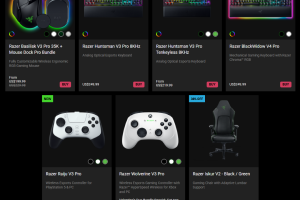From NFTs to cryptocurrency payments, blockchain changes the way games are perceived, played, and monetized is completely changing. Below, we will look at four key ways the gaming industry uses blockchain to improve gaming and create fresh opportunities.
NFT Casino Games
Non-fungible tokens (NFTs) have become the talk of the town in gaming – although you could argue they were a flop in the beginning if you were there for those very early ‘dinosaur’ days. Still, gaming is giving them a rebirth, rewarding gamers a sense of true ownership of their virtual assets.
Besides, blockchain has already made its mark on the gaming world as a whole. The online casino is being transformed by this technology, not least of all because it ensures player security and offers a level of anonymity that regular casinos just can’t match. Security is also what makes a concept like the inclave casino so popular among savvy players – this unique login method keeps users’ sensitive data secure and protected from hackers.
But what about NFTs, given how much headway they’ve already made in the gaming world and their proximity to the blockchain tech?
In current NFT games, players can own assets like characters, skins, guns, or virtual areas of land – in an online casino game, prizes could be given in the form of NFTs, rather than money. Additionally, NFT gaming ecosystems are exploring cross-border synergies, meaning someone could rock up to the poker table with a Bored Ape t-shirt and then head off to Rise of the Undeads in the same ‘fit. These items are recorded on a digital ledger that guarantees their limited supply and genuineness.
For example, Axie Infinity and Decentraland have made this structure more prevalent, making it possible for players to make real money by selling their in-game assets on NFT marketplaces. The idea of play-to-earn makes video gaming more immersive besides being financially rewarding.
Cryptocurrency Payments
Another essential use of blockchain in the gaming industry is cryptocurrency payments. Traditional payment methods often involve high fees, long processing times, or location restrictions. Cryptocurrencies like Bitcoin or Ethereum that you can use to play crypto poker offer an alternative with no borders that is also fast and cheap.
Developers can use this feature to bring in users worldwide who will find it easier to pay via cryptocurrencies while purchasing their products on various platforms worldwide. That is definitely convenient when it comes to buying things like subscriptions to games or other micro-transactions.
Platforms like these may offer exclusive content or discounts for customers who pay with cryptocurrencies, encouraging this payment type. Cryptocurrencies are also decentralized, making them more secure and reducing the risk of fraud and chargebacks.

Decentralized Gaming Platforms
The concept of decentralized gaming platforms is based on blockchain technology, resulting in a fairer and more transparent environment for playing games. These platforms do not have a central authority, which makes it possible for developers to communicate directly with users. The fairness and trustworthiness of smart contracts incorporated into various game aspects are guaranteed.
A typical example is Enjin, a platform that makes it easier for developers to create blockchain-based games. By tokenizing the in-game items, developers may also find new income streams. The decentralization approach encourages creativity, giving both developers and players more power over what they experience during gameplay.
Blockchain-Based Game Development
Blockchain technology is enhancing the security and transparency of game development. Security matters about game assets, transactions, and user activities within the game itself – these records cannot be tampered with using blockchain. With that being said, however, all things done in-game will be seen by others who want proof, including cheating or even theft.
For example, player achievements could be protected via blockchain so that they cannot be changed or duplicated. And, it can track economies within virtual environments, offering visibility into how virtual currencies are distributed or used.
This level of openness helps create an atmosphere of trust among participants, thus guaranteeing fair play. This unchangeability prevents unauthorized modifications to video games since publishers may utilize blockchain records as evidence against intellectual property thefts.
Blockchain is constantly advancing, so expect even more revolutionary gaming applications. The convergence of gaming and blockchain is still in its early stages; it holds, however, an exciting route ahead. We will see how far it goes in 2024!






 Your total news and information resource for all things Science, Technology, Engineering / Mathematics, Art, and Medicine / Health.
Your total news and information resource for all things Science, Technology, Engineering / Mathematics, Art, and Medicine / Health.
Leave a Comment